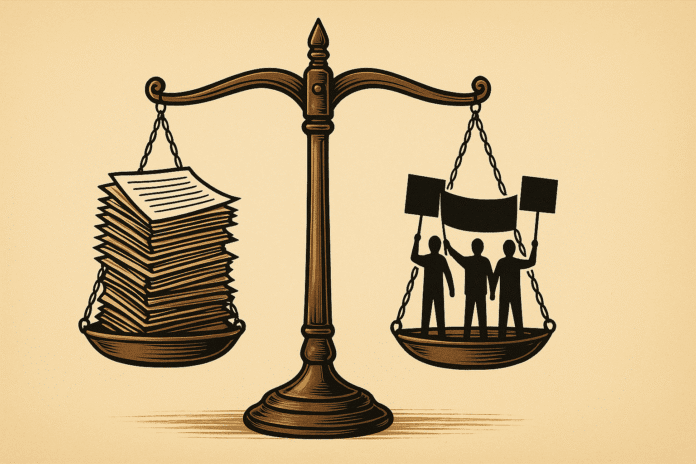A Tennessee courtroom showdown forces America to examine its flawed deportation policies and the fight for due process.
Kilmar Abrego Garcia’s not guilty plea in Tennessee is more than a legal maneuver—it is a flashpoint in the national discourse over deportation practices and due process rights. In a case that spans a controversial traffic stop in 2022, a disputed deportation in March 2025, and fierce courtroom debates, Garcia’s story reveals how administrative errors and political pressures can upend the lives of immigrants. This article delves into the events surrounding his case, analyzes the competing legal arguments, and discusses how this controversy may shape future U.S. immigration policy.
The Charges and the Traffic Stop
The Incident in Tennessee
On November 30, 2022, law enforcement in Cookeville, Tennessee, pulled over a Chevrolet Suburban operated by Kilmar Abrego Garcia, a Salvadoran national residing in Maryland. During the traffic stop, police discovered that Garcia was transporting nine Hispanic men who lacked proper identification or luggage—a detail that immediately aroused suspicion. Although Garcia maintained that the passengers were en route from a construction site in St. Louis to Maryland, officers failed to find any evidence of construction materials or tools that would support his story.
The federal authorities later built a case around this traffic stop, alleging that Garcia was involved in a large-scale human smuggling operation. Prosecutors claim that Garcia made more than 100 trips between Texas and Maryland over nearly a decade, allegedly transporting hundreds of undocumented migrants. In response, Garcia’s legal team has repeatedly stressed that the charges, which also include unverified claims of involvement with the notorious MS-13 gang, are exaggerated and politically motivated.
The Federal Indictment
In May 2025, a federal grand jury indicted Garcia on multiple counts related to human smuggling. If convicted, he could face substantial prison time for each individual allegedly smuggled. The prosecution’s narrative paints Garcia as a key facilitator in a sweeping criminal enterprise, while his defense argues that the evidence is circumstantial at best. As one of Garcia’s attorneys remarked at the arraignment, “The government’s case is built on speculation and unsubstantiated claims. There is no credible evidence linking Mr. Garcia to a criminal smuggling ring or to gang activities.”
The 2019 Court Order and the Deportation Controversy
The Protective 2019 Order
In 2019, Garcia was granted “withholding of removal” by an immigration judge—a legal protection meant to shield him from deportation to El Salvador, where he could face persecution. This decision came after careful review of his case, during which the judge found that the evidence of gang affiliation was tenuous and based on discredited reports. The order was intended to ensure that Garcia was not sent back to an environment that might threaten his safety or violate his rights.
The March 2025 Deportation
Despite the clear protection afforded by the court order, Garcia was deported in March 2025—an action that U.S. Immigration and Customs Enforcement (ICE) later termed a “clerical error.” The deportation led to his detention in El Salvador at a notorious high-security facility. This glaring oversight not only violated the judicial protection but also set off a firestorm of protests and legal challenges from immigrant rights advocates and lawmakers alike.
Senator Chris Van Hollen commented on the incident, stating, “This is a clear violation of due process and undermines the integrity of our judicial system. No individual with a protective court order should face such treatment.”
Legal Battles Over Wrongful Removal
Garcia’s deportation, carried out in defiance of a binding court order, has intensified legal scrutiny of the processes governing removals. Defense attorneys argue that the error reflects broader systemic issues within U.S. immigration enforcement, where bureaucratic oversights can lead to wrongful deportations. Legal experts warn that such errors erode trust in the immigration system and set a dangerous precedent that may compromise future protections under the law.
The Return and Renewed Prosecution
Garcia’s Return to U.S. Soil
After a protracted period of legal wrangling and public outcry, Garcia was returned to the United States in early June 2025 to face the human smuggling charges. His arrival back on American soil rekindled debates about the administration’s responsibility to uphold court orders and the balance between national security and individual rights.
The Federal Case Reignites Debate
The renewed federal prosecution claims that Garcia is not only a flight risk but also a dangerous individual who purportedly assisted in transporting undocumented migrants as part of an extensive smuggling operation. In contrast, his defense insists that the charges are deeply flawed, emphasizing that the breach of his court-ordered protections should preclude the severity of the allegations now brought before the federal court.
During a pretrial hearing, Garcia’s legal team challenged the government’s move to detain him, arguing that the prolonged detention in the wake of a wrongful deportation constitutes an abuse of power and a violation of his constitutional rights. This legal tug-of-war has placed Garcia’s case squarely at the intersection of criminal law and immigration reform.
Public Response and the Broader Legal Context
Protests, Advocacy, and Public Outcry
Garcia’s plight has resonated with numerous advocacy groups and ordinary citizens who see his case as emblematic of a broader failure in the U.S. immigration system. Organizations like CASA have been at the forefront of protests, decrying the wrongful deportation and the subsequent harsh treatment he has received. At rallies, demonstrators have raised banners proclaiming “Due Process for All” and “Stop Wrongful Deportations,” highlighting public frustration over what they view as systemic injustice.
A spokesperson for one such group noted, “Kilmar’s story is not just about one man—it represents the countless individuals who face the real-life consequences of a broken system. His case underscores the urgent need for reform.”
Legal Experts and Constitutional Concerns
Legal scholars have voiced sharp criticism of the government’s actions, focusing particularly on the constitutional guarantees of due process enshrined in the Fifth and Fourteenth Amendments. The wrongful deportation, carried out in direct defiance of a judicial safeguard, has been condemned as an alarming breach of immigrant rights. Critics argue that if the government can ignore court orders under political or administrative pretexts, the foundational principles of justice and fairness are at stake.
U.S. District Judge Paula Xinis remarked, “This misstep is wholly lawless. It not only jeopardizes individual rights but also undermines public confidence in our legal institutions.”
The Impact on Immigration Policy
Garcia’s case is prompting lawmakers to reconsider how deportation orders are implemented and the measures needed to ensure judicial oversight. There are growing calls for comprehensive reforms in immigration enforcement protocols to prevent administrative errors that risk innocent lives. Both advocates and policymakers stress that safeguarding due process is essential—not just for individual justice, but for upholding the rule of law across the nation.
Proposals under discussion include tighter procedural checks for deportation decisions, enhanced accountability for administrative mishaps, and better training for ICE agents to ensure compliance with court orders.
The Bigger Picture: Deportation Policy and Due Process
Constitutional Rights and Systemic Flaws
At its heart, the controversy surrounding Kilmar Abrego Garcia’s case spotlights a critical tension in today’s immigration landscape: the struggle to balance robust law enforcement with the unwavering protection of constitutional rights. The U.S. legal system guarantees due process to every person residing within its borders, regardless of citizenship status. Yet, the events of the past few years reveal a growing disconnect between written law and its execution.
The wrongful deportation of Garcia, in blatant disregard of a protective court order, raises fundamental questions about the efficacy of oversight in immigration practices. If such errors are permitted to occur, the integrity and fairness of the entire deportation process stand compromised.
Looking Ahead: Reform and Accountability
The legal and political fallout from this case is already sparking debates that may lead to lasting changes in immigration policy. Lawmakers, legal experts, and human rights activists are united in calling for reforms that ensure administrative accountability and prioritize the protection of due process. This case could very well serve as a catalyst for sweeping policy revisions designed to safeguard against the kind of egregious errors that Garcia experienced.
A Call to Action
Kilmar Abrego Garcia’s not guilty plea is not just a legal declaration—it is an urgent appeal for a more just and accountable immigration system. His case underscores how administrative lapses and politically charged decisions can blur the line between law enforcement and injustice. As public opinion continues to rally for reform, it falls upon each of us to demand that our government uphold its constitutional promises without compromise.
If you believe that due process should prevail and that every individual deserves a fair treatment under the law, now is the time to act. Engage with your community, contact your local representatives, and support organizations that champion immigrant rights. The future of U.S. immigration policy—and the lives it touches—demand nothing less.




